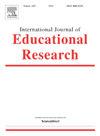中学一年级学生校本规划方案的有效性:一项聚类随机对照试验
IF 2.5
3区 教育学
Q1 EDUCATION & EDUCATIONAL RESEARCH
引用次数: 0
摘要
在中学教育中,许多学生在计划作业方面有困难。这些困难可能不仅会导致短期后果,如成绩下降,而且还会带来长期的心理、专业和经济挑战。为了帮助学生解决计划问题,我们使用迭代开发方法开发了一个基于学校的程序(学校作业计划(PLOS))。公共科学图书馆包括两个阶段:公共科学图书馆基础课程,一个六课的预防性课程,包括课堂技能培训;公共科学图书馆额外课程,一个六课的个人模块化技能培训,针对在公共科学图书馆基础课程之后仍需要支持的学生。本整群随机对照试验比较了213名一年级学生(11-14岁,78.9%为男性)在接受plos -基础课程后仍有计划问题的短期和长期效果。主要结果是家庭作业问题和计划技能。次要结果包括学习动机、课堂行为、注意缺陷/多动障碍(ADHD)行为和学校成绩。我们发现在主要或次要结果测量上,组间没有显著的短期或长期差异。随着时间的推移,PLOS-extra组和PAU组都出现了一些显著的改善。PLOS-extra缺乏效果可能归因于规划技能的自然提高,我们样本中规划问题的中度严重程度或程序的设计。此外,学校在确保有效实施该计划所需的资源方面面临挑战。尽管PLOS-extra是与最终用户合作开发的,但这些挑战表明,在教育背景下制定可行的培训计划是非常复杂的。学校专业人士和政策制定者必须决定是投入时间、精力和资源来实施循证规划项目,还是开发和测试在日常学术生活中提供支持的新项目。本文章由计算机程序翻译,如有差异,请以英文原文为准。
The effectiveness of a school-based planning program for first year students in secondary school: A cluster randomized controlled trial
In secondary education, many students have difficulties planning their schoolwork. These difficulties may not only lead to short-term consequences such as lower grades, but also to long-term psychosocial, professional and financial challenges. To support students with planning problems, we developed a school-based program (Planning of Schoolwork (PLOS)) using an iterative development approach. PLOS includes two phases: PLOS-basic, a six-lesson preventive program with in-class skills training and PLOS-extra, a six-session, individual, modular skills training for students who still need support after PLOS-basic. This cluster randomized controlled trial compares the short- and long-term effects of PLOS-extra to practice-as-usual (PAU) with 213 first year students (aged 11-14, 78.9% male) who still had planning problems after PLOS-basic. Primary outcomes were homework problems and planning skills. Secondary outcomes included school motivation, classroom behavior, attention-deficit/hyperactivity disorder (ADHD) behaviors and school grades. We found no significant short- or long-term between-group differences on either the primary or the secondary outcome measures. Some significant improvements over time were present for both the PLOS-extra and the PAU group. The lack of effects of PLOS-extra may be attributed to a natural improvement of planning skills, the moderate severity of planning problems in our sample or the design of the program. Furthermore, the schools faced challenges in securing the necessary resources to implement the program effectively. Although PLOS-extra was developed in collaboration with end-users, these challenges demonstrate the complexity of developing training programs that are feasible within the educational context. School professionals and policymakers must decide whether to invest time, effort and resources into implementing evidence-based planning programs or in developing and testing new programs that offer support throughout daily academic life.
求助全文
通过发布文献求助,成功后即可免费获取论文全文。
去求助
来源期刊

International Journal of Educational Research
EDUCATION & EDUCATIONAL RESEARCH-
CiteScore
6.20
自引率
3.10%
发文量
141
审稿时长
21 days
期刊介绍:
The International Journal of Educational Research publishes regular papers and special issues on specific topics of interest to international audiences of educational researchers. Examples of recent Special Issues published in the journal illustrate the breadth of topics that have be included in the journal: Students Perspectives on Learning Environments, Social, Motivational and Emotional Aspects of Learning Disabilities, Epistemological Beliefs and Domain, Analyzing Mathematics Classroom Cultures and Practices, and Music Education: A site for collaborative creativity.
 求助内容:
求助内容: 应助结果提醒方式:
应助结果提醒方式:


